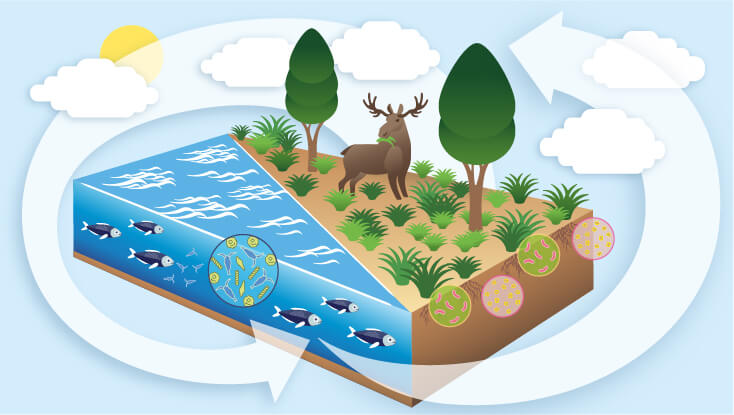General background and overarching question
Interactions between plants, animals and microbiota constitute the structure and functioning of terrestrial, coastal, and marine ecosystems. The upcoming conference will address the open question: How do these biotic interactions shape the impacts of ecosystems on climate?
Biotic interactions and ecosystem-climate feedbacks
Direct impacts of climate and climatic change on biota are extensively studied, and the general short- and long-term effects of ecosystem processes and properties on climate are relatively well known. Both biogeochemical feedbacks of ecosystems to the climate through e.g. carbon sequestration and greenhouse gas emissions and biogeophysical feedbacks through changes in transpiration and albedo have been acknowledged in the past. Yet it is unclear how biotic interactions between plants, animals and microbiota mediate these biogeochemical and biogeophysical feedbacks of ecosystems to the climate and how this may change with global warming. This has potentially strong implications for projections of future climate change and ecosystem functioning due to additional effects of biotic interactions.

Graphic: UHH/Wohlfahrt
Aims and scope of the conference
The aim of this conference is to bring together the world´s foremost experts on the role of biotic interactions for ecosystem functioning and possible feedbacks to the climate system.
We welcome contributions from terrestrial, coastal, and marine ecosystems, ranging in approaches from molecular biology to ecosystem ecology and from experimentation to modelling. The overall aim of the conference is to discuss the state of knowledge and establish new vital directions for research. Oral and poster contributions as well as group and panel discussions aim at addressing the following key questions:
Which role do biotic interactions play for biogeochemical and biogeophysical feedbacks of ecosystems to climate?
Which experimental approaches and analytical tools can be used to quantify the role of biotic interactions?
How can interdisciplinary crosstalk contribute to synthesize our current knowledge and to pave the way for future research directions?
General organisation
The conference is meant to bring together both senior and early career researchers. The backbone of the meeting and basis of the discussion groups is a series of lectures given by invited world-leading scientists. In addition, a poster session will be held where all scientists can contribute with their own research. We would especially encourage early career scientists to participate in the meeting and contribute to the poster session!
We will complete our discussions with a field trip to a whole-ecosystem warming experiment in a salt marsh on the North Sea coast of Germany on the last day of the meeting.
Conference chairs
Kai Jensen - Plant Ecology, Institute of Plant Science & Microbiology, Universität Hamburg
Nicole Aberle-Malzahn - Phytoplankton-Microzooplankton Interactions, Department of Biology, Norwegian University of Science and Technology, Trondheim (Norway)
Christian Beer - Dynamics of Soil Processes, Institute of Soil Science, Universität Hamburg
Ina Meier - Functional Forest Ecology, Institute of Wood Science, Universität Hamburg
Christian Möllmann – Marine Ecosystem Dynamics and Management, Institute of Marine Ecosystem and Fishery Science, Universität Hamburg
Philipp Porada - Ecological Modeling, Institute of Plant Science & Microbiology, Universität Hamburg
Elisa Schaum - Plankton Ecology and Evolution, Institute of Marine Ecosystem & Fisheries Science, Universität Hamburg
Viktoria Unger - Plant Ecology, Institute of Plant Science & Microbiology, Universität Hamburg
Conference office
Susanne Stirn & Amelie Meyer
Institute of Plant Science & Microbiology
Ohnhorststr. 18
22609 Hamburg
Germany
Email: bcm2023@uni-hamburg.de
